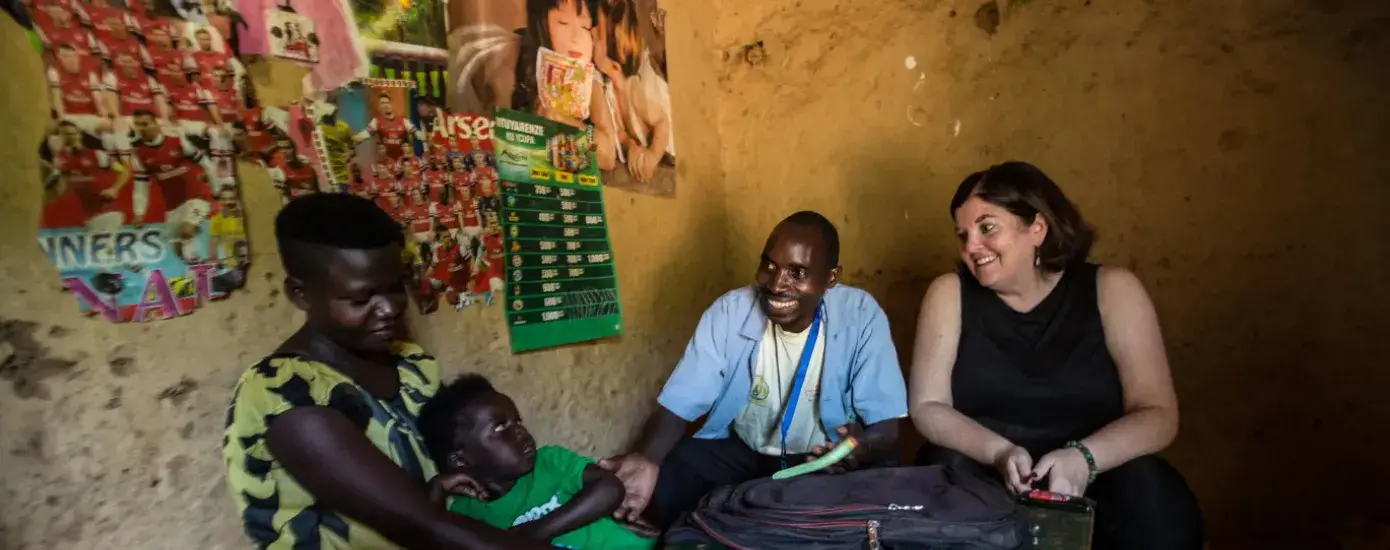
Dr. Sheila Davis, Chief Executive Officer of Partners In Health, credits the MGH Institute’s Doctor of Nursing Practice (DNP) with encouraging her to think broadly about global health issues including population health, health financing, and patient outcomes.
“So many of the faculty encouraged me to stretch, think big, and always look for a unique and innovative solution,” said Davis, who in 2008 was among the first three graduates of the program. “If I hadn’t done the DNP at the Institute, there is no way I would be at Partners In Health right now.”
Davis, who earned her Master of Science in Nursing from the IHP in 1997 and later spent several years on the nursing faculty, joined Partners In Health (PIH) in 2010. Before becoming the first nurse to run the organization starting in 2019, she had been Chief of Clinical Operations, Chief Nursing Officer, and head of PIH’s Ebola response. She was also instrumental in the launch of the organization’s oncology care programs in Haiti and Rwanda.
A non-profit social justice organization that brings the benefits of modern medical science to the poorest and sickest communities around the world, PIH is working to ensure that the universal human right to quality health care is realized. Founded in 1987 by the late Dr. Paul Farmer, PIH has grown from a small organization in Haiti to a global nonprofit in 11 countries, in addition to the United States where it works in close partnership with Navajo Nation and now provides technical assistance to various communities following the Massachusetts-based Community Tracing Collaborative during the height of the COVID pandemic. PIH has responded to epidemics and outbreaks such as Ebola in West Africa and cholera in Haiti; it has established tuberculosis programs in Lesotho and HIV programs in Rwanda.
Davis has used her IHP education to lead the development of PIH’s 5-year strategic plan to strengthen the nonprofit’s connection with its 19,000 employees. Core to this strategy is decentralizing decision-making to ensure that the perspectives around the table are representative of those in closest proximity to the delivery of care in the communities PIH serves.
“We changed our leadership structure to have experts from our sites help run the organization as a whole,” said Davis. “It has allowed us to do a better job responding to the needs of people living in poverty with poor healthcare access by having those voices at the table.”
Davis points to PIH’s University of Global Health Equity (UGHE) in Rwanda as an example of this approach, creating an institution dedicated to health equity in an environment where health disparities are most acutely felt. The university, founded in 2015, operates a master’s degree program in global health delivery. It launched a medical school in June 2020, and is expected to add programs in nursing, gender studies, and One Health, a Centers for Disease Control and Prevention transdisciplinary initiative that recognizes the health of people is closely connected to the larger ecosystem of animal and environmental health. By offering quality health education in proximity to students’ home communities and with a culturally and geographically relevant curriculum, UGHE builds local workforce and trains the next generation of health care professionals to practice equity-driven medicine in Rwanda.
“I’ll never be a good Haitian nurse or Rwandan nurse,” she said. “I don’t live there. I don’t know the context. I don’t know the culture. But I can bring what I know and learn from the experts there. We try to combine it. There is synergy together and we learn from each other.”
Davis’ first exposure to global health was during the global HIV pandemic. She worked in several countries and co-founded a small NGO that worked on health projects, including a rural clinic, in South Africa and Boston from 2004 to 2010.
“There is no money to be saved by not investing in global health solutions,” she said. “That will only lead to more deadly and expensive health crises. The world needs better health systems and universal health care.”
Her goal is to lead an organization that builds a model for strengthening community health care systems. “It’s often at times like this, from the post-earthquake, post-cholera, Ebola, and now COVID, where it’s pretty evident that places in the world that are more vulnerable and don’t have strong health systems suffer the most and have the worst outcomes,” she said.
From Davis’ point of view, nurses are perfectly positioned to have the greatest impact on health systems because they are rooted at the community level.
“Nurses work in all aspects of healthcare systems and can play a key role in redesigning health care,” she said. “They can use the pandemic as a catalytic moment to advocate for better care at every level. From the patient to the policy level, we need to redesign health care and design new models of care with a community focus.”
